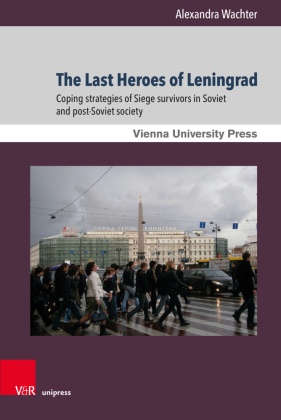The Last Heroes of Leningrad - Coping strategies of Siege survivors in Soviet and post-Soviet society. Dissertationsschrift
| Verlag | V&R unipress |
| Auflage | 2022 |
| Seiten | 282 |
| Format | 16,0 x 2,0 x 23,6 cm |
| Gewicht | 527 g |
| Artikeltyp | Englisches Buch |
| Reihe | Zeitgeschichte im Kontext Band 017 |
| ISBN-10 | 3847114476 |
| EAN | 9783847114475 |
| Bestell-Nr | 84711447A |
Subject to political fluctuations, official remembrance ranged from enforced silence to extensive exploitation for propaganda purposes, a framework which corresponded with psychological strategies to cope, but not deal, with trauma: repression, denial, acting-out and idealization. Based on a combination of oral history interviews, ethnographic and archival research, this study examines narratives and activities of child and adolescent survivors. Individual experiences are related to varying degrees of involvement in survivors' organisations, and thick description adds to the understanding of trauma in the context of a (post-)totalitarian society.
The Siege of Leningrad - the History of a Trauma
Alexandra Wachter investigates how survivors of the Siege of Leningrad (1941-44) were able to come to terms with their memories in Soviet and post-Soviet society. Subject to political fluctuations, official remembrance ranged from enforced silence to extensive exploitation for propaganda purposes, a framework which corresponded with psychological strategies to cope, but not deal, with trauma: repression, denial, acting-out and idealization. Based on a combination of oral history interviews, ethnographic and archival research, this study examines narratives and activities of child and adolescent survivors. Individual experiences are related to varying degrees of involvement in survivors' organisations, and thick description adds to the understanding of trauma in the context of a (post-)totalitarian society.
The Siege of Leningrad - the History of a Trauma
Alexandra Wachter investigates how survivors of the Siege of Leningrad (1941-44) were able to come to terms with their memories in Soviet and post-Soviet society. Subject to political fluctuations, official remembrance ranged from enforced silence to extensive exploitation for propaganda purposes, a framework which corresponded with psychological strategies to cope, but not deal, with trauma: repression, denial, acting-out and idealization. Based on a combination of oral history interviews, ethnographic and archival research, this study examines narratives and activities of child and adolescent survivors. Individual experiences are related to varying degrees of involvement in survivors' organisations, and thick description adds to the understanding of trauma in the context of a (post-)totalitarian society.

